- Home
- T.A. Barron
The Mirror of Fate
The Mirror of Fate Read online
Enter the mirror . . .
The glinting surface suddenly shuddered, splitting along a crack. Out flowed a long, writhing tentacle of mist that reached toward the boy. The vapors brushed his chin, curled around his ear, then drew back. All at once, the Mirror snapped completely flat. Our reflections, clearer than before but more deeply shadowed, confronted us. At the same time, the sound of a distant chime rolled out of the depths, rising from somewhere far beneath the surface. My own sword caught the sound, ringing faintly in response.
“Of course it means nothing to me,” said the cat, grooming a paw, “but it might be wise to hold hands.” It paused, flashing an invisible eye at me. “And never, ever let go. Unless you don’t mind being lost forever.”
As the cat went back to licking itself, I linked hands with Ector. I turned, glancing back at Hallia, feeling another, deeper pain in my chest. Then, on a silent command, the two of us strode into the Mirror.
PUFFIN BOOKS
Published by the Penguin Group
Penguin Young Readers Group, 345 Hudson Street, New York, New York 10014, U.S.A.
Penguin Group (Canada), 90 Eglinton Avenue East, Suite 700, Toronto, Ontario, Canada M4P 2Y3
(a division of Pearson Penguin Canada Inc.)
Penguin Books Ltd, 80 Strand, London WC2R 0RL, England
Penguin Ireland, 25 St Stephen’s Green, Dublin 2, Ireland (a division of Penguin Books Ltd)
Penguin Group (Australia), 250 Camberwell Road, Camberwell, Victoria 3124, Australia
(a division of Pearson Australia Group Pty Ltd)
Penguin Books India Pvt Ltd, 11 Community Centre, Panchsheel Park, New Delhi - 110 017, India
Penguin Group (NZ), 67 Apollo Drive, Rosedale, Auckland 0632, New Zealand
(a division of Pearson New Zealand Ltd.)
Penguin Books (South Africa) (Pty) Ltd, 24 Sturdee Avenue,
Rosebank, Johannesburg 2196, South Africa
Registered Offices: Penguin Books Ltd, 80 Strand, London WC2R 0RL, England
First published in the United States of America as The Mirror of Merlin by Philomel Books,
a division of Penguin Young Readers Group, 1999, Paper-over-board edition, 2007
Published as The Mirror of Fate by Puffin Books, a division of Penguin Young Readers Group, 2011
Patricia Lee Gauch, editor
Text copyright © Thomas A. Barron, 1999
Map illustration copyright © Ian Schoenherr, 1999
All rights reserved
THE LIBRARY OF CONGRESS HAS CATALOGED THE PHILOMEL BOOKS EDITION AS FOLLOWS:
Barron, T. A. The mirror of Merlin / T. A. Barron.
“Book four of ‘The lost years of Merlin.’”
p. cm.
Summary: Through adventures involving a haunted marsh, talking trees, and the creature called the ballymag, the young wizard Merlin continues to experience both his growing powers and his essential humanity.
ISBN: 978-0-399-25023-1 (hc)
1. Merlin (Legendary character) —Juvenile Fiction. [1. Merlin (legendary character)—Fiction.
2. Wizards—Fiction. 3. Fantasy.]
I. Title
PZ7.B27567 Mi
1999 [Fic]—dc21 99-13043 CIP
Puffin Books ISBN 978-0-14-241922-9
Design by Gunta Alexander
Text set in Galliard
Printed in the United States of America
Except in the United States of America, this book is sold subject to the condition that it shall not, by way of trade or otherwise, be lent, re-sold, hired out , or otherwise circulated without the publisher’s prior consent in any form of binding or cover other than that in which it is published and without a similar condition including this condition being imposed on the subsequent purchaser.
The publisher does not have any control over and does not assume any responsibility for author or third-party Web sites or their content.
This book is dedicated to
M. Jerry Weiss
devoted friend of students, teachers, and wizards
with special appreciation to
Jennifer Herron
AUTHOR’S NOTE
One thing never changes about Merlin: He continues to surprise.
That is true in the earliest tales, first sung by Welsh bards fifteen centuries ago; it is no less so today. It is true in Merlin’s fabled elder years, when he has become the mentor to King Arthur, mage of the Round Table, and central figure in the wondrous tragedy we call Camelot. And it is no less true in Merlin’s youth, as he struggles to find his own name, his own self, and his own destiny.
Perhaps his knack for surprise flows from the sheer depth—and complexity—of his character. (As merely one of the latest in a long line of Merlin’s chroniclers, I am struck by how much of his character, after fifteen centuries, remains still unexplored.) Perhaps it stems from the powerful magic that starts to emerge within him during his youth. Or, perhaps, from the mysterious future that awaits him—as alluring as it is terrifying.
Or his ability to surprise may flow from something far more simple, far more basic: Merlin’s own humanity. In this volume, the fourth in The Lost Years of Merlin epic, his surprises come less from his swelling gifts and dawning greatness than from his fundamental human frailties. For all his growing powers, and growing passions, he remains a mortal man.
To be sure, Merlin has come a long way from the fateful day that began the saga of his lost years. On that day a bedraggled, half-drowned boy washed ashore on a strange coastline. Almost instantly, death pursued him. Yet, for all the fears that filled his thoughts, he felt mainly aware of what he lacked: He had no memory of his childhood, his parents, nor even his own name. It was, in his own words, a day “harsh, cold, and lifeless . . . as empty of promise as my lungs were empty of air.”
Although Merlin survived that day, his more challenging journey had only just begun. Since then, he has discovered some of the secrets of Fincayra, a land as elusive as the mist that swirls about its borders, an island resting in between the mortal Earth and the immortal Otherworld. He has learned much about his past, though less about his identity. He has found his parents, and the truth about his birth. He has gained a few friends—and lost a few, as well.
And Merlin has succeeded on other fronts: He has healed a wounded dragon, run like a deer, spawned the Dance of the Giants, discovered a new way of seeing, solved the riddle of the Seven Songs, heard the whispers of an ancient shell, survived being swallowed by a living stone, taken the spirit of his sister into himself and borne her to the Otherworld, triumphed over creatures who devour magic, and mastered the legendary Wheel of Wye. He has built a musical instrument of his own design—and realized that its music lay less in the strings than in the hands that plucked them.
Yet despite all his successes, Merlin’s greatest challenges lie ahead. He must somehow come to understand the depth of his own humanness: its capacity for triumph, and also for tragedy.
How else can he ever become, in his later years, that mentor to King Arthur we know so well? To play his part in the Arthurian cycle—and in the even grander cycle of myth that stretches long before and after—Merlin must know humanity well. Immensely well. He must know our highest aspirations, as well as our deepest frailties. He must understand that even the best intentions may be riddled with flaws, that even promised salvation may hold serious dangers.
He must, in short, know himself. But how to see himself in the truest mirror? And where might such a mirror be found? Perhaps its reflections are seen in disparate places, if only in disguised form. Perhaps its images, whether highly luminous or deeply shadowed, hold some surprises of their own.
Only when Merlin can view himself with utter clarity can he hope to guide a young, idealistic monarch.
To support him in creating a new social order, with the Round Table at its heart, even though it is doomed to fail in its time. To help the young leader, despite everything, to find hope. And, perhaps, to try again.
As Merlin reveals the secrets of his lost years, and continues to surprise me along the way, one thing never changes: I am deeply grateful to the friends who have encouraged and counseled me. As always, I owe a lasting debt of thanks to my wife, Currie, and my editor, Patricia Lee Gauch. In addition, I am most grateful to Kylene Beers, for her unwavering faith, as well as her wisdom. Kristi Dight deserves thanks for encouraging The Tale of the Whispering Mist, which Hallia tells her companions on a dark night in the marshland. Special thanks also go to Deborah Connell, Kathy Montgomery, Suzanne Ghiglia—and, as always, the elusive wizard himself.
T. A. B.
In misty dreams and shadowed memories
Of fabled cities I have dwelt apace . . .
In crystal splendor I have spanned the seas
And clothed myself in legendary grace.
—From a sixth-century poem,
SONG OF DYFYDDIAETH
The world from which the stories came
lies still within the astral mists . . .
—W.B.Yeats
PROLOGUE
Many are the mirrors I have examined; many are the faces I have seen. Yet for all these years—lo, all these centuries—there is but one mirror, with one visage, I cannot forget. It has haunted me from the start, from that very first instant. And it haunts me no less to this day.
Mirrors, I assure you, can cause more pain than broadswords, more terror than ghouls.
Under the stone archway, mist billowed and swirled, roving about like an all-seeing eye.
The mist did not rise from the ground, or from some steaming pool nearby. Rather, this mist formed out of the very air under the arch, behind the strange, quivering curtain that held it back as a dam might hold a swelling tide. Even so, the vapors often pushed past, licking the purple-leafed vines that wrapped around the pillars. But more often, as now, they churned deep within the archway, forming and dissolving shapes in endless procession: ever changing, ever the same.
Then, without warning, the curtain of mist shuddered, hardening into a flat sheet. Beams of light struck its surface, breaking apart like shards of glass; vague shapes from the surrounding marshes reflected there. Somewhere behind the reflections, clouds continued to churn, touched by dark, distorted shadows. And a mysterious light, glinting from the depths beyond.
For this curtain was truly a mirror, one filled with mist—and more. A mirror with its own movement, its own pulse. A mirror with something stirring far beneath its surface.
Suddenly, from the very center came a waft of vapors, followed by something else—something slender. And twisted. And alive. Something very much like a hand.
With long nails, sharper than claws, the fingers reached outward, groping. Three of them, then a fourth, then a thumb. Wisps of mist from the marsh curled around them, adorning them with delicate, lacelike rings. But the fingers shook free before closing into a fist.
For a long moment, the fist squeezed itself tightly, as if testing its own reality. The skin, nearly as pale as the surrounding vapors, went whiter still. The fingernails dug deeper into the flesh. All over, the fist quivered from strain.
Ever so slowly, the hand started to relax. The fingers uncurled, flexed, and worked the air. Hazy threads wove themselves around the thumb and stretched across the open palm. At the same time, the mirror itself darkened. From the edges of the crumbling stones, deep shadows seeped inward, covering the surface. In a few moments, the whole archway gleamed like a black crystal, its smooth surface unbroken but for the pale hand squirming in its center.
A sharp creaking split the air. It might have come from the mirror, or the ancient stones themselves, or somewhere else entirely. With it came a scent—compellingly sweet, akin to rose blossoms.
A wind stirred, carrying away both the sound and the perfume. Both vanished into the rancid terrain of the Haunted Marsh. No one, not even the marsh ghouls themselves, noticed what had happened. Nor did anyone witness what happened next.
The hand, fingers splayed wide, lunged forward. Behind it came the wrist, forearm, and elbow. The gleaming surface suddenly shattered, melting back into a shifting, quivering mirror, as restless as the mists within its depths.
Out of the archway strode a woman. As she planted her boots on the muddy ground, she smoothed the creases on her white robe and silver-threaded shawl. Tall and slender she stood, with eyes as lightless as the interior of a stone. Glancing back at the mirror, she smiled grimly.
She gave her black, flowing locks a shake, and turned her attention to the marsh. For a long moment she listened to its distant wailing and hissing. Then she grunted in satisfaction. Under her breath, she whispered: “This time, my dear Merlin, you shall not elude me.”
With that, she gathered her shawl about her shoulders and strode off into the gloom.
PART ONE
1: SHADOWS
I strained, throwing all my strength into the task, but my shadow refused to move.
Again I tried. Still, the stubborn shadow would not budge. Closing my eyes—a meaningless gesture, since they couldn’t see anyway, having been replaced by my second sight over three years ago—I tried my best to concentrate. To perceive nothing but my shadow. That was not easy, on a bright summer day like this, though it still seemed easier than my task.
All right, then. Clearing my mind, I pushed aside the sound of rustling grasses on this alpine meadow, and of splattering streamwater nearby. No smells of springmint, or lavender, or pepperwort—almost strong enough to make me sneeze. No boulder, roughened by yellow lichens, resting beneath me; no mountains of Varigal, streaked with snow even in summer, rising above me. No wondering about whether I might encounter my old friend, the giant Shim, in these hills so near his home. And, most difficult of all, no drifting into thoughts about Hallia.
Just my shadow.
Starting from the bottom, I traced the shadow’s outline on the grass. There were my boots, leather straps dangling, planted firmly on top of the boulder. Then my legs, hips, and chest, looking less scrawny than usual because of my billowing tunic. Protruding from one side, my leather satchel—and from the other, my sword. Next, my arms, bent with hands resting on hips. And my head, turned sideways just enough to show the tip of my nose, which, much to my consternation, had started to hook downward in recent months. Already more beak than nose, it reminded me of the hawk who had inspired my name. Then, of course, came my hair: even blacker than my shadow. And, I grumbled to myself, just as unruly.
Move, I commanded silently, all the while keeping my own body motionless.
No response.
Lift yourself, I intoned, focusing all my thoughts on the shadow’s right arm.
Still no response.
I released a growl. Already I had wasted the entire morning trying to coax it to move independently. So what if shadow-working was a skill reserved only for the eldest wizards—true mages? I never was much good at waiting.
I drew a long, slow breath. Lift. Lift, I say.
For a long moment, I stared, exasperated, at the dark form. Then . . . something started to change. Slowly, very slowly, the shadow’s outline started to quiver. The edges of its shoulders grew blurry, while its arms quaked so violently they seemed to swell in size.
Better. Much better. I forced myself not to move, not even to brush away the bothersome drops of perspiration rolling down my temples. Now, right arm. Lift yourself.
With a sharp jerk, the shadow’s arm straightened. And lifted—all the way above the head. Though I held my own body fixed, a thrill raced through me—a mixture of excitement, and discovery, and pride in my growing powers. At last, I had done it! Worked my own shadow! I could hardly wait to show Hallia.
Though I felt as if I could fly off the boulder, I kept myself still. Only my widening grin betrayed my feelings. Ret
urning my attention to the shadow, its arm still raised, I savored my success. To think that I, barely fifteen years of age, could move my shadow’s—
Left arm? My whole chest constricted. It should have moved the right, not the left! With a roar, I stomped my boots and waved my own arms angrily. The shadow, as if in spite, did the same back at me.
“You foolish shadow! I’ll teach you some obedience!”
“And when will that be?” asked a resonant voice behind me.
I spun around to face Hallia. Stepping as lightly as a doe, she seemed more supple than the summer grass. Yet I knew that, even in her young woman’s form, she was ever alert to any possible danger—ready to run like the deer she could become in an instant. As the sunlight glinted on her auburn braid, her immense brown eyes watched me with humor. “Obedience, if I recall, isn’t one of your strong points.”
“Not me, my shadow!”
Her eyes sparkled mischievously. “Where leaps the stag, so leaps his shadow.”
“But—but I . . .” My cheeks grew hotter as I stammered. “Why do you have to appear right now? Just when I’ve botched everything?”
She stroked her long chin. “If I didn’t know better, I might think you had been hoping to impress me.”
“Not at all.” I clenched my fists, then shook them at my shadow. Seeing it wave its own fists back at me only made me angrier. “Fool shadow! I just want to make it do what it should.”
Hallia bent to study a sprig of lupine, as deep purple as her robe. “And I just want to keep you a little humble.” She sniffed the tower of petals. “That’s usually Rhia’s responsibility, but since she’s off learning the speech of the canyon eagles—”
“With my horse to carry her,” I grumbled, trying to stretch my stiff shoulders.

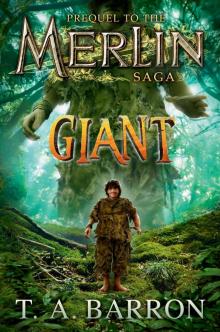 Giant
Giant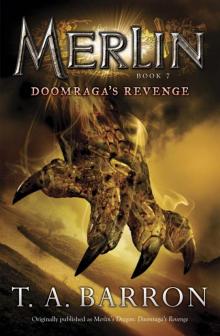 Doomraga's Revenge
Doomraga's Revenge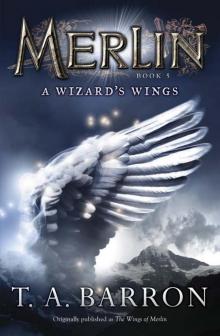 A Wizard's Wings
A Wizard's Wings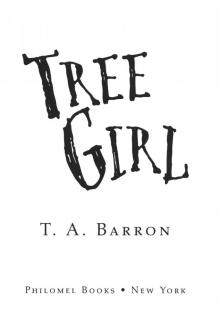 Tree Girl
Tree Girl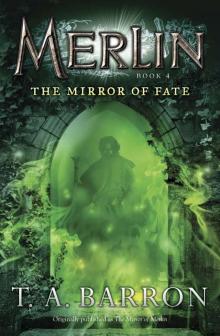 The Mirror of Fate
The Mirror of Fate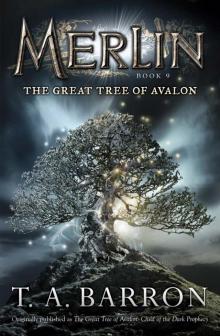 The Great Tree of Avalon
The Great Tree of Avalon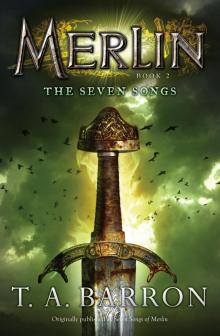 The Seven Songs
The Seven Songs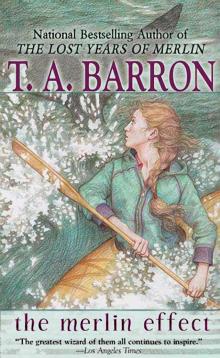 The Merlin Effect
The Merlin Effect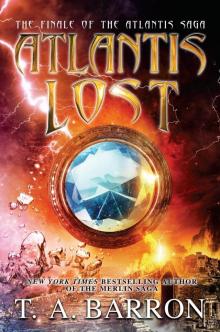 Atlantis Lost
Atlantis Lost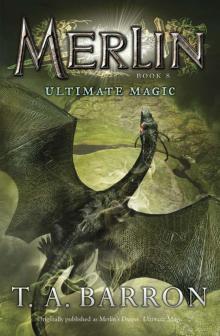 Ultimate Magic
Ultimate Magic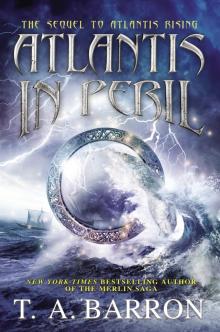 Atlantis in Peril
Atlantis in Peril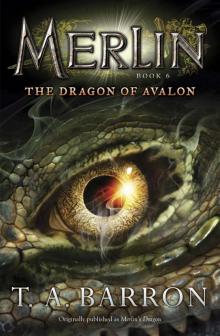 The Dragon of Avalon
The Dragon of Avalon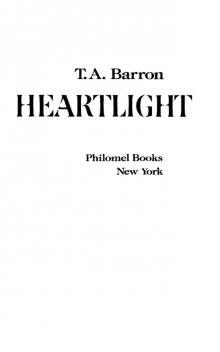 Heartlight
Heartlight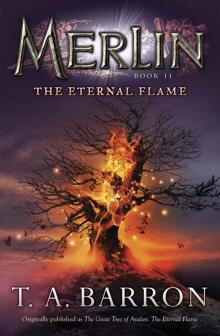 The Eternal Flame
The Eternal Flame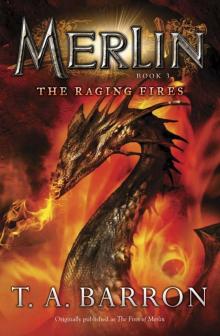 The Raging Fires
The Raging Fires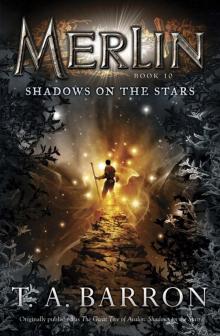 Shadows on the Stars
Shadows on the Stars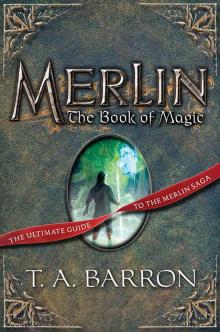 Merlin: The Book of Magic
Merlin: The Book of Magic The Lost Years
The Lost Years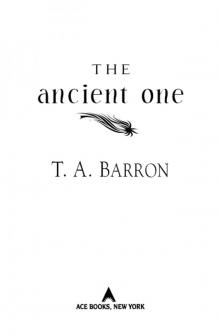 The Ancient One
The Ancient One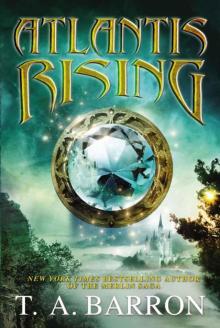 Atlantis Rising
Atlantis Rising